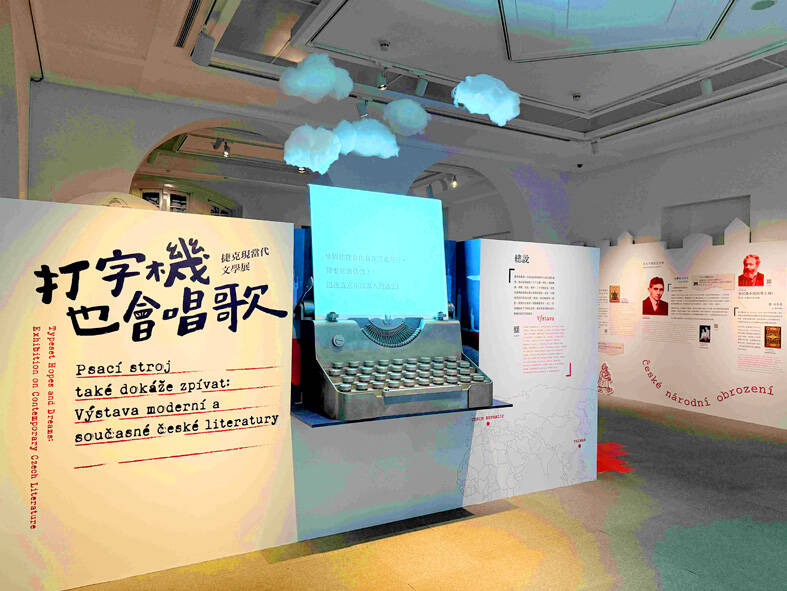Manuscripts of Czech writers and records of their plight at the hands of state security police in the former Czechoslovakia are on display at the National Museum of Taiwan Literature (NMTL) as part of the Contemporary Czech Literature Exhibition.
The exhibition, titled “Typewriters Can Also Sing,” is a collaboration among the NMTL, the Museum of Czech Literature and other cultural institutions in the Czech Republic. It features rarely seen manuscripts and documents of Czech writers from the 20th century, as well as translations of Czech writers’ work in Chinese.
During the “Normalization” period from 1968 to 1987, in which the former Czechoslovakian regime aimed to restore the political situation before the Prague Spring in 1968 and preserve the status quo, writers were closely watched by the state security police, and their works were banned by the government, the NMTL said.

Photo courtesy of the National Museum of Taiwan Literature
As such, many writers continued writing by going underground or fleeing to other countries, it said.
Typewriters played an important role in Czech literature, as Czech writers typed up manuscripts and had them secretly published to avoid a crackdown from the authoritarian regime, the NMTL said.
“The title of the exhibition shows a poetic imagination of Czech underground literature. The words that were typed out became melodies that inspired people to pursue freedom and democracy,” it said.
Items that are on display in the exhibition were borrowed from the Museum of Czech Literature, Moravian Library, Moravian Museum and other institutions.
Many of items in the exhibition are displayed in Asia for the first time, including Czech writer Bohumil Hrabal’s typewriter and manuscripts, audio books by writer Milan Kundera, security police records of writer Ivan Klima and books published by 68 Publishers, a Toronto-based publishing house that was founded by Czech expatriate Josef Skvorecky and his wife, Zdena Salivarova, in 1971 to publish books by Czech and Slovak writers whose works were banned in the former Czechoslovakia.
For the exhibition, the NMTL also showed a copy of Taiwan’s Tomorrow magazine published in 1930, in which The Insect Play — written by Czech playwrights Karl and Josef Capek — was translated into Chinese by the magazine’s founder Huang Tien-hai (黃天海). Prior to the exhibition, the copy was stored in the archived section of the National Taiwan Library.
The exhibition opened on Dec. 6 and is to run through March 2 next year.

‘DENIAL DEFENSE’: The US would increase its military presence with uncrewed ships, and submarines, while boosting defense in the Indo-Pacific, a Pete Hegseth memo said The US is reorienting its military strategy to focus primarily on deterring a potential Chinese invasion of Taiwan, a memo signed by US Secretary of Defense Pete Hegseth showed. The memo also called on Taiwan to increase its defense spending. The document, known as the “Interim National Defense Strategic Guidance,” was distributed this month and detailed the national defense plans of US President Donald Trump’s administration, an article in the Washington Post said on Saturday. It outlines how the US can prepare for a potential war with China and defend itself from threats in the “near abroad,” including Greenland and the Panama

A wild live dugong was found in Taiwan for the first time in 88 years, after it was accidentally caught by a fisher’s net on Tuesday in Yilan County’s Fenniaolin (粉鳥林). This is the first sighting of the species in Taiwan since 1937, having already been considered “extinct” in the country and considered as “vulnerable” by the International Union for Conservation of Nature. A fisher surnamed Chen (陳) went to Fenniaolin to collect the fish in his netting, but instead caught a 3m long, 500kg dugong. The fisher released the animal back into the wild, not realizing it was an endangered species at

The Chinese Nationalist Party (KMT) is maintaining close ties with Beijing, the Democratic Progressive Party (DPP) said yesterday, hours after a new round of Chinese military drills in the Taiwan Strait began. Political parties in a democracy have a responsibility to be loyal to the nation and defend its sovereignty, DPP spokesman Justin Wu (吳崢) told a news conference in Taipei. His comments came hours after Beijing announced via Chinese state media that the Chinese People’s Liberation Army’s Eastern Theater Command was holding large-scale drills simulating a multi-pronged attack on Taiwan. Contrary to the KMT’s claims that it is staunchly anti-communist, KMT Deputy

The High Prosecutors’ Office yesterday withdrew an appeal against the acquittal of a former bank manager 22 years after his death, marking Taiwan’s first instance of prosecutors rendering posthumous justice to a wrongfully convicted defendant. Chu Ching-en (諸慶恩) — formerly a manager at the Taipei branch of BNP Paribas — was in 1999 accused by Weng Mao-chung (翁茂鍾), then-president of Chia Her Industrial Co, of forging a request for a fixed deposit of US$10 million by I-Hwa Industrial Co, a subsidiary of Chia Her, which was used as collateral. Chu was ruled not guilty in the first trial, but was found guilty